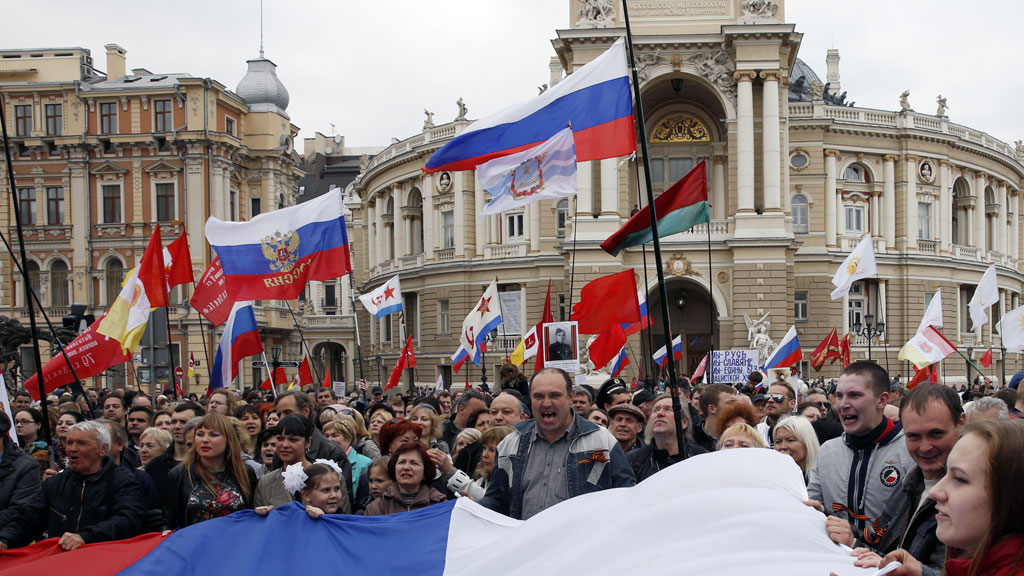Novorossiya: is Ukraine part of Putin’s ‘resurgent Russia’?
President Putin pledges to do all he can to protect fellow Russians living in what he’s called “Novorossiya” – the historic name for part of Ukraine. How great a threat do his words represent?

Pro-Russian militants control buildings in about ten towns in eastern Ukraine after launching their uprising on 6 April.
In the biggest province in the region they have declared an independent “People’s Republic of Donetsk”.
On Wednesday Ukraine’s interior ministry said three pro-Russian separatists were shot dead in a clash with Ukrainian forces in Mariupol. The west said Russia is aiding the pro-Russian activists occupying buildings.
European countries and the United States are threatening Russia with more sanctions unless it takes steps to show it will de-escalate the conflict in Ukraine.
‘New Russia’
However, in a live televised phone-in session on Thursday, Mr Putin made reference to “Novorossiya” – “New Russia” – and said Russia would do “everything” to help the Russian-speaking population in eastern Ukraine.
According to the New Republic website, “Novorossiya” was the name of the former Ottoman territory that Catherine the Great conquered in the Russo-Turkish Wars, which is now within southern and eastern Ukraine.
Read more: will Russia invade eastern Ukraine?
Russian forces colonised the land in the late 18th century and established the cities of Sevastopol, Simferopol, Tiraspol, and Odessa.
The territories were “handed to Ukraine in the 1920s by the Soviet government.”
Mr Putin said: “God knows [why it was taken away].”
According to the Kiev Post newspaper, a map found in the Kiev communist party headquarters – and published on the paper’s website – showed Ukraine partitioned into four regions and described the southern province as “Novorossiya”.
@andrewsweiss As usual, it’s a term with a history. @wjantholis @NOVORUSSIA2014 pic.twitter.com/8EwRH1HVxG
— James Cameron (@CameronJJJ) April 5, 2014
Mr Putin also said that people in the Transnistrian region of Moldova – which, like Ukraine, borders Russia, should have the right to decide their own fate.
Professor Margot Light of the London School of Economics, told Channel 4 News that Mr Putin’s language would have hit the right notes with Russians.
‘Anti-western rhetoric’
She said: “Mr Putin is not very popular internationally but he plays the anti-western rhetoric well and is hugely popular back home [in Russia]. ‘Novorossiya’ plays into the notion of a resurgent Russia.”
Mr Putin also dismissed the current Ukrainian authorities in Kiev as illegitimate: “they cannot be legitimate, they do not have a national mandate to rule the country. And that speaks for itself. Having said that, we are not refusing contacts with anybody. There are open contacts on the ministerial level.”
Novorossiya plays into the notion of a resurgent Russia – Professor Margot Light
Mr Putin said Ukrainian presidential elections, scheduled to take place on 25 May, were inherently flawed after protests forced the overthrow of Ukrainian president Viktor Yanukovych.
Professor Margot Light added: “Putin wants a constructional settlement that gives a voice to Russian speakers in Ukraine.
“If he lets it play out, and violence continues to spread, it will give him the pretext to force a settlement in Ukraine.”
Raoul Ruparel from Open Europe told Channel 4 News: “Despite attempting to distance himself from events in Ukraine, it was clear that he continues to push the narrative of instability and insecurity in Russia’s backyard.”
-
Latest news
-
Laughing Boy: New play tells the tragic tale of Connor Sparrowhawk5m

-
Sewage warning system allows some of worst test results to be left off rating system, analysis shows3m

-
Post Office inquiry: Former CEO didn’t like word “bugs” to refer to faulty IT system4m

-
Israeli soldier speaks out on war in Gaza12m

-
PM’s defence spending boost should be ‘celebrated’, says former Armed Forces Minister4m

-





